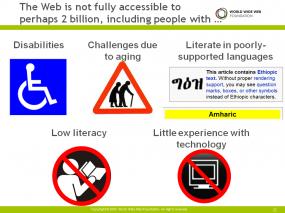Today and tomorrow, in Raleigh, North Carolina, USA, the 7th International Cross-Disciplinary Conference on Web Accessibility is taking place. Most call this event Web for All or W4A. The focus this year is “Developing Regions: Common Goals, Common Problems?”, which is perfect fit for the Web Foundation’s initial focus. I had the honor of delivering the opening keynote, entitled, “Breaking Barriers to a Read/Write Web that Empowers All” (PDF, PPT).
The vast majority in the room have a background in making the Web accessible for people with disabilities, and a great deal of progress has been made in this area. The participants were receptive to my message that perhaps an additional 1 billion people are being excluded by current Web technology and practice: e.g., people increasingly challenged by age, people reading languages that don’t work well on the Web, people trying to create and find content in most of the world’s nearly 7,000 active languages, people with low literacy, and/or those with little experience with technology.
I issued a call to action: We need to increase our efforts – individually and cooperatively – to make the Web accessible to all people. We should leverage the experience in accessibility for disabled people to accelerate work to lower barriers for the other, above-mentioned groups of people in developed and developing countries.
I look forward to talking with others here in the next two days, as well as listening to presentations, to learn more about accessibility challenges and ideas for solutions. Perhaps we’ll find new collaborators. Follow W4A on Twitter at #w4a10


Leave a Reply
You must be logged in to post a comment.